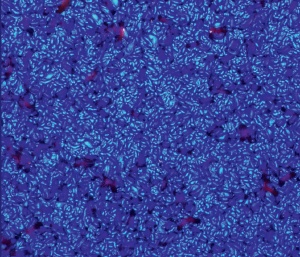May 5 2009
The second generation of the Axio Imager microscope system from Carl Zeiss is setting new standards in materials microscopy. Whether in quality testing and assurance, in materials analysis or the development of future materials - optical quality, performance and comfort are the major benefits of the Axio Imager. The microscope system provides clear operation and open interfaces for communication with other systems and network connection. The upgradeability of the sturdy systems enables users to also meet future demands.
 Micrograph of a polycrystalline silicon solar cell taken with the Axio Imager microscope system from Carl Zeiss, brightfield, EC Epiplan- APOCHROMAT 50x/0.95.
Micrograph of a polycrystalline silicon solar cell taken with the Axio Imager microscope system from Carl Zeiss, brightfield, EC Epiplan- APOCHROMAT 50x/0.95.
Special features of the Axio Imager also include its flexibility and the continuous vertical adjustment of the sample area and an optical system that provides maximum information about the sample in all contrasting techniques, e.g. brightfield, darkfield or C-DIC.
The new Axio Imager generation for materials microscopy is the ideal platform for imaging solutions in digital microscopy – for precise and reproducible results. Four versions are available – from coded and partly motorized to fully motorized – which individually meet the users’ demands on a microscope system for materials analysis, materials development and quality inspection. The M2m and Z2m versions feature motorized reflected-light beam paths and motorized Z-drives. The high-performance focus of the Z2m model ensures consistent precision at a step width of 10 nanometers even in continuous operation at high loads. Furthermore, this model features automatic component recognition. With the motorized versions, the user design of the TFT display has been completely revised to guarantee even more operating convenience.
Additional technical improvements include the capability to combine reflected and transmitted light into mixed light, access to the luminous-field diaphragm and aperture diaphragm planes in the reflected-light beam path in all versions, the exchangeability of the fine drive knob and the fine drive disk, and a newly designed transmitted-light beam path for more homogeneous illumination in transmitted light even with low objective magnifications.
The line of EC Epiplan-APOCHROMAT objectives that can be used with the Axio Imager meets the highest demands and provides optimum results in materials microscopy. The EC Epiplan- NEOFLUAR HD/DIC and EC Epiplan-NEOFLUAR HD lines result in additional versions matched to the different user requirements. The high-quality EC EPIPLAN line of objectives will meet the demands of users faced with specific routine tasks in materialography. If a longer working distance is required, the LD versions offer the necessary space on the sample.
The microscope system is primarily tailored to the needs of the metal-working, mining and photovoltaic industries, and research institutions in the fields of materials sciences and geology. It can be supplemented with the AxioCam camera and the AxioVision software from Carl Zeiss. However, the stand is also available in the Non-Metallic Inclusions (NMI), Particle Analyzer and LSM 700 complete systems.